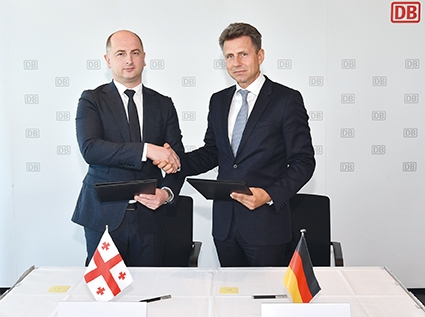Georgian Railway, Deutsche Bahn Become Official Partners
Georgian Railway and Deutsche Bahn entered a new stage of cooperation in an agreement signed by David Peradze, CEO of Georgian Railway, and Alexander Doll, Member of the Board of Management for Freight Transport and Logistics at Deutsche Bahn, in Berlin. The agreement lays the foundation for future joint projects in the rail freight sector. By signing the agreement, Georgian Railway and Deutsche Bahn embark on a strategic partnership to strengthen the European and Asian multimodal transportation corridors.
“This strategic alliance is mutually beneficial and marks a cornerstone. Maintaining close ties with Georgian Railway will help us to further grow our business as it puts us closer to the Asian market and opens up new perspectives for future endeavors,” said Doll.
“Georgian Railway is very active in developing the Europe-Asia corridors,” Peradze noted. “Therefore, it is logical that we partner up with Deutsche Bahn. Together with DB, we are going to team up and foster international freight transportation and offer competitive products. This will certainly benefit us and increase the competitiveness of the Georgian logistics market.”
With Deutsche Bahn, the largest rail freight provider in Europe, Georgian Railway cooperates with a reliable and strong business partner. In the context of this cooperation, Georgian Railway will be responsible for cargo transports with the destination Middle East and India, coming from Constanta and passing through Georgia and Azerbaijan, as well as for transports to East Asia via the Caspian Sea. Deutsche Bahn will be responsible for organizing transports within the EU by rail freight. Multimodal transports will be handled by its subsidiary DB Schenker.
The newly-formed partnership will foster mutual support between the companies in multiple ways, including the exchange of resources such as knowledge, expertise, information as well as employees.
The partnership of Georgian Railway and Deutsche Bahn sets an outstanding example considering the continuous growth of the Asian-European rail cargo market.
By Anna Zhvania











